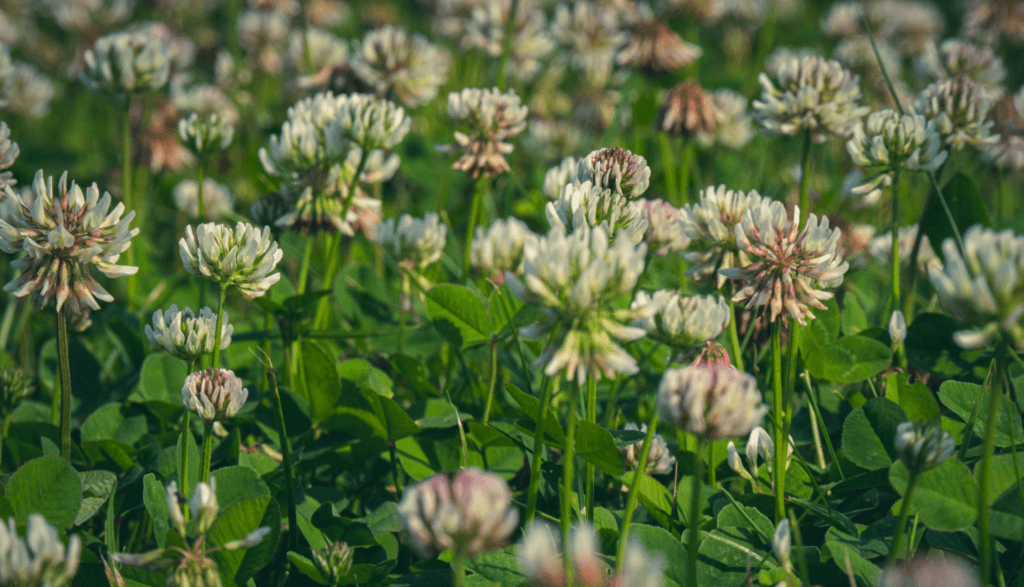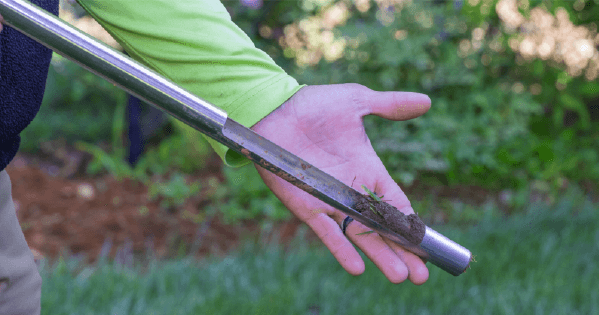Clover is not always good luck

Clover is often considered a weed in lawns and gardens where it is not intentionally cultivated. In agricultural contexts, it is a beneficial cover crop because it adds nitrogen to the soil. To the Georgia homeowner, however, clover is an undesirable ground cover that gives an uneven appearance to a lawn’s manicure.
What is clover?
Clover is a cool-season perennial plant that offers benefits to farmers because of its high nitrogen content. In this setting, clover provides nutrients that enrich the soil and produce healthier crops. In a neighborhood setting, clover is considered an undesirable weed that can quickly become a problem if it is not kept under control.
Clover, like many plants, has a fibrous root system consisting of numerous thin, branching roots that spread out near the soil surface. These roots help anchor the plant in the soil and absorb water and nutrients.
What does clover look like?
The most common characteristic of clover plants is the presence of three leaflets typically oval or egg-shaped, with a smooth margin. The arrangement of these leaves gives the plant a shamrock-like appearance. Occasionally, a fourth leaf will grow, which has become the symbol of good luck. With its short stem, clover grows close to the ground. Atop each leaflet is a pale triangular mark. When it flowers, clusters of white or pinkish, pea-like blooms pop.
Where does clover grow best?
Under-fertilized lawns make the perfect breeding ground for clover. This weed grows best in full sun, but it can also grow well in partially shaded, thin areas of turfgrass. Clover is more likely to grow in soil that is poor in nitrogen and creeps in where grass is sparse forming in patches.
What are the benefits and hazards of clover?
Clover is a drought-tolerant plant that provides needed nitrogen to soil, but that doesn’t mean it’s always a good thing. It can attract beneficial insects, but also pests such as aphids, which can negatively affect nearby plants.
Certain clover species are valuable as forage crops for livestock as they can be a nutritional food source. They also are grown as a cover crop to prevent soil erosion, weed suppression, and soil improvement.
When it comes to growing a healthy lawn, clover is an unwelcome competitor for turfgrasses. It’s also an invasive species that can choke out native vegetation and cause ecological consequences.
In addition, clover pollen is an allergen that causes hay fever-like symptoms during the growing season.
How can clover be managed?
A clover infestation is a sign of poor lawn maintenance. This can be turned around, however, by putting simple strategies into practice.
Prevention:
- A thick, healthy lawn can suppress the growth of clover. Proper watering, fertilization, and pest control all contribute to a healthy lawn. Use a combination of these methods for the best approach.
Control:
- Depending on the severity of the infestation, simple methods such as regular mowing and hand-pulling can reduce the presence of clover. A combination of these will work as long as the infestation is mild.
- For a more severe infestation, cultural control methods such as fertilization and overseeding can help. Because clover likes nitrogen-poor soil, applying nitrogen rich fertilizer will promote grass growth and suppress clover. Overseeding will establish a dense grass cover, therefore making it more difficult for clover to thrive. Aeration of the soil is another cultural practice that can help improve drainage and promote grass growth.
- Chemical control methods, such as post-emergent herbicides specifically designed to control broadleaf weeds like clover, target the weeds while sparing desirable grasses. This method is best when there are large patches of clover present in your lawn.
- Professional help is always best when facing a severe weed infestation. Consult with a lawn care professional for an assessment of your lawn’s condition and recommended treatments. Professionals also can test soil to determine nutrient levels and create a treatment program specific to your lawn’s condition.
Want to get rid of clover for good?
Simply Green Lawn Care Plus experts are trained in weed and pest control to keep your Georgia lawn lush and green year-round. If clover is a problem on your property, contact your trusted lawn care professionals today for an assessment and treatment plan. Hiring a professional can save you time and effort and ensure the removal of clover is done effectively and with minimal impact on your lawn.
About Simply Green Lawn Care

Simply Green aims to provide the highest quality lawn care, mosquito control, and lawn pest control services to Georgia residents.
We are locally owned and operated which allows us to be accessible, attentive, and responsive for customers in Georgia.
Our well-trained team is easy to work with and determined to exceed expectations.
All our plant health care specialists are Georgia Department of Agriculture Certified and maintain their Category 24 applicators license.


